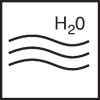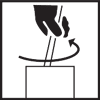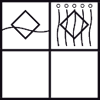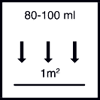Article No. 346320
Water-based intermediate and final coat for an oiled effect on dimensionally stable building elements; for dipping and flow coating

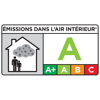
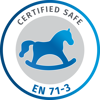
Product specifications
The stated values represent typical product characteristics and are not to be construed as binding product specifications.
Field of application
- For use on interior and exterior wood
- Soft and hard woods
- Dimensionally stable wood building elements: e.g. windows and doors
- Protected constructions: e.g. wood-aluminium windows
- Intermediate and finishing coats
Properties
- Quick drying
- Natural, matt surface produces an oiled effect
- Pleasant feel
- No tendency to self-ignite as can occur in products that dry via oxidation
- Free from film preservation and wood protection biocides
-
Preparation
-
Substrate requirements
The substrate must be clean, dry, free of dust, grease and loose substances, and prepared in the correct manner.
Dimensionally stable wood building elements: wood moisture content 11-15%
-
Preparations
If necessary, impregnate non-resistant woods with a wood preservative* (*Use biocides safely. Always read the label and product information before use).
If necessary, protect parapet joints with Induline V-Joint Protection or Induline AF-920.
-
-
Application
-
Application requirements
Temperature of the material, air and substrate: from min. 15 °C to max. 30 °C.
-
Stir well, including during application or after a break in work.
Immersion and flow coating.
Carry out intermediate sanding before applying a final coat: P 220-240, remove sanding dust.
Seal opened containers well and use contents as soon as possible.
-
Application instructions
-
Check colour, adhesion and compatibility with the substrate by setting up a trial area.
Before coating technically modified woods and wood-based materials, apply the product to a trial surface and conduct a suitability test on the desired area of use.
Prior to full application, please apply a test coat to a sample area under practical conditions using the desired system, then test or examine the surface properties.
Ensure good ventilation.
If the viscosity increases due to evaporation, this must be compensated for with water (target viscosity: runout time approx. 24 - 28 s in 3 mm ISO cup).
Dilute with up to 10% water to improve flow properties in unfavourable conditions (elevated temperatures, low humidity). Add water to make up for any moisture lost through evaporation.
If foaming occurs in the flow coating system, it is recommended to add 0.2-1.0% VP 9325 defoaming agent - strength 2.
Substances in oak may bleed, causing dark discolouration, when coated with water dilutable dispersion stains.
To prevent any substances in the wood from becoming active, forced drying should be carried out.
The system finder on our website www.remmers.com contains coating recommendations for specific wood types to be used when treating windows and exterior doors.
-
Drying
Low temperatures, poor ventilation and high humidity delay drying.
-
Thinning
If necessary, dilute with 5 - 10% water.
-
Working tools / cleaning
-
Flow coating facility, dipping tank
Clean tools with water or Aqua RK-898 Cleaning Concentrate immediately after use.
Ensure that any residue from cleaning is disposed of correctly.
-
Storage / shelf life
-
If stored unopened in its original container in a cool, dry place and protected against frost, the product will keep for at least 12 months.
-
Usage
-
80 - 100 ml/m² per coat
(corresponds to dry film thickness of approx. 20 µm)
As specified in the VFF Code of Practice (ÖNORM B 3803 and ÖNORM C 2350), the required minimum coat thickness in the case of special coating systems for wood/metal windows is approx. 40 µm.
The stated values refer to undiluted material.
-
General information
-
DIN EN 71-3 "Migration of certain elements":
This product complies with the limits for the migration of heavy metals to children's toys according to DIN EN 71-3 and thus fulfils one of several further requirements for the safety of children's toys according to the EU "Toy Directive" (2009/48/EC).Sealing:
Pre-treat surfaces to be sealed with Silicone Primer P.
Sealing compounds must be compatible with the coating and may only be applied once the coating has dried thoroughly.
Only use sealing profiles that are free of plasticisers.
Care and maintenance:
Wood is subjected to great climatic and environmental stresses when outdoors. The coat is susceptible to the processes of natural ageing, wear and decomposition. Decomposition takes place at different speeds, depending on the stress (weak, average, strong) placed on the wood building element. Weathering stages may vary according to the part or element affected. To give wood the longest and best possible protection it is advisable to examine surfaces every year. Any damage found should be addressed immediately after cleaning.
We recommend that repairs be carried out using Induline OW-810 (3462).
Observe current standards and guidelines for coating wood building elements outdoors (Codes of Practice issued by the German Association of Window and Facade Manufacturers (VFF), Code of Practice No. 18 issued by the German Federal Committee for Paint and the Protection of Material Assets (BFS), guidelines issued by the German Lacquer and Printing Ink Association (VdL) and ift guidelines issued by the Institut für Fenstertechnik).
Observe the information sheets “Upkeep and Maintenance of Dipping Tanks and Flow Coating Facilities” and “Information on Workplace Hygiene”.
-
-
Disposal instructions
-
Larger quantities of leftover product should be disposed of in the original containers in accordance with the applicable regulations. Completely empty, clean containers should be recycled. Do not dispose of together with household waste. Do not allow to enter the sewage system. Do not empty into drains.
-
-
Safety / regulations
-
For further information on the safety aspects of transporting, storing and handling the product and on disposal and environmental matters, please see the current Safety Data Sheet.
-




